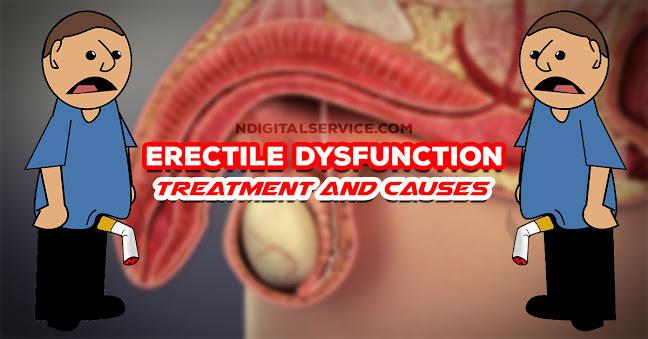What is Erectile Dysfunction?
Erectile dysfunction can be a symptom of a physical or mental ailment. It can lead to anxiety, relationship problems, and a lack of self-confidence.
The primary symptom is a man's inability to obtain or maintain a hard adequate erection for sexual intercourse.
Patients with erectile dysfunction should be checked for any underlying physical or psychological issues first. Medication and assistance devices, such as pumps, can be prescribed if treating the underlying issues does not help. The inability to obtain and maintain a firm adequate erection for sexual intercourse is known as erectile dysfunction (ED). According to estimates, one out of every ten men will get Erectile Dysfunction (ED) at some point in their life. It's crucial to realize that Erectile Dysfunction (ED) is usually a symptom of another, more serious issue. At any age, Erectile Dysfunction ED is not considered normal, and it can be linked to other issues that interfere with sexual intercourse, such as a lack of desire and orgasm and ejaculation issues.
Is erectile dysfunction very common?
Approximately one out of every ten adult guys will develop Erectile Dysfunction (ED) over time.
Many men have erection failure on occasion, which can be caused by a variety of factors including excessive alcohol use, stress, relationship issues, or extreme exhaustion.
It's not uncommon to have trouble getting an erection less than 20% of the time, and it usually doesn't require therapy. Failure to obtain an erection more than 50% of the time, on the other hand, usually indicates that there is an issue and that therapy is required.
Erectile dysfunction (ED) does not have to be a part of growing older. While some older men may require more stimulation, they should still be able to get an erection and enjoy sexual activity.
Erectile dysfunction (ED) is caused by a number of factors. Erectile Dysfunction Treatment
A number of variables can contribute to ED, including:
- Vascular disease: Blood supply to the penis can become blocked or narrowed as a result of vascular diseases such as atherosclerosis (hardening of the arteries).
- Neurological disorders (such as multiple sclerosis): Nerves that send impulses to the penis can become damaged from stroke, diabetes, or other causes.
- Psychological states: These include stress, depression, lack of stimulus from the brain, and performance anxiety.
- Trauma: An injury could contribute to symptoms of Erectile Dysfunction ED.

Erectile Dysfunction (ED) can be caused by a variety of factors, including chronic sickness, some drugs, and a disorder known as Peyronie's disease. Prostate, bladder, and colon cancer surgeries may potentially have a role.
Also, Read This:
Gigantx Reviews: Does It works Really?
Penis Enlargement Food Supplement
Which drugs have the potential to cause erectile dysfunction (ED)?
Erectile dysfunction (ED) is a common adverse effect of many pharmaceutical medications. While these medications may be used to treat an illness or condition, they can have an adverse effect on a man's hormones, nerves, or blood circulation, leading to ED or raising the risk of ED.
Do not stop taking your medicine if you are experiencing ED and believe it is due to the medication you are taking. Contact your doctor if the problem persists; he or she may be able to prescribe an alternative medicine. The following are examples of drugs that may list ED as a possible side effect:
- Diuretics (pills that cause increased urine flow).
- Antihypertensives (high blood pressure drugs).
- Antihistamines.
- Antidepressants.
- Parkinson's disease drugs.
- Antiarrhythmics (a drug for irregular heart action).
- Tranquilizers.
- Muscle relaxants.
- Nonsteroidal anti-inflammatory drugs.
- Histamine H2-receptor antagonists.
- Hormones.
- Chemotherapy medications.
- Prostate cancer drugs.
- Anti-seizure medications.
These recreational and regularly misused drugs, among others, can cause or lead to ED:
- Alcohol.
- Amphetamines.
- Barbiturates.
- Cocaine.
- Marijuana.
- Methadone.
- Nicotine.
- Opiates.
These medicines not only influence and frequently depress the central nervous system, but they can also damage blood vessels, resulting in permanent ED Erectile Dysfunction.
How Erectile dysfunction (ED) is diagnosed in a variety of ways?
Because ED Erectile Dysfunction can have a range of causes, your doctor may perform a variety of tests to diagnose the illness and discover the cause. It is only after determining the cause of ED that it may be adequately treated.
Your doctor will review your medical history and do a thorough physical examination before ordering any tests. In addition, the doctor will conduct an "interview" with you regarding your personal and sexual history. Some of these inquiries will be extremely personal and may feel intrusive. It is critical, however, that you answer these questions truthfully. The following are examples of possible questions:
- What medications or drugs are you currently using? This includes prescription drugs, over-the-counter drugs, herbals, dietary supplements, and illegal drugs.
- Have you had any psychological problems such as stress, anxiety, and depression?
- When did you first notice symptoms of ED?
- What are the frequency, quality, and duration of any erections you have had?
- What are the specifics of the circumstances under which ED first occurred?
- Do/did you experience erections at night or during the morning?
- What sexual techniques do you use?
- Are there problems in your current relationship?
The doctor may also want to question your sexual partner because he or she may know more about the underlying problems.
Your doctor may request one of the following tests to further assess your issue after your physical examination and discussion:
- Complete blood count (CBC): This is a set of blood tests that, among other things, can detect the presence of anemia. Anemia is caused by a low red blood cell count and can cause fatigue, which in turn can cause ED.
- Liver and kidney function tests: These blood tests may indicate whether ED may be due to your kidneys or liver functioning improperly.
- Lipid profile: This blood test measures the level of lipids (fats), like cholesterol. High levels may indicate atherosclerosis (hardening of the arteries), which can affect blood circulation in the penis.
- Thyroid function test: One of the thyroid hormones' functions is to regulate the production of sex hormones, and a deficiency in these hormones may contribute to or cause ED.
- Blood hormone studies: Testosterone and/or prolactin levels in the blood may be measured to see if abnormalities in either of these sex hormones are present.
- Urinalysis: Analysis of urine can provide a wealth of information, including information on protein, sugar, and testosterone levels. Abnormal measurements of these substances can indicate diabetes, kidney disease, or a testosterone deficiency, all of which can cause Erectile Dysfunction (ED).
- Duplex ultrasound: This is perhaps the best test for evaluating Erectile Dysfunction (ED). An ultrasound uses high-frequency sound waves to take "pictures" of the body's tissues. For people with Erectile Dysfunction (ED), an ultrasound may be used to evaluate blood flow and check for signs of a venous leak, atherosclerosis (hardening of arteries) or tissue scarring. This test is performed both while the penis is erect (usually induced by an injection of a drug that stimulates erection) and also while it is soft.
Testolan Review: Is It Good To Purchase? Read This before buy
- Bulbocavernosus reflex: This test evaluates nerve sensation in the penis. During the test, your doctor will squeeze the head of your penis, which should immediately cause your anus to contract. If nerve function is abnormal, there will be a delay in response time.
- Nocturnal penile tumescence (NPT): This test measures a man's erectile function while he is sleeping. Normally, a man will have five or six erections while asleep. A lack of these erections may indicate there is a problem with nerve function or circulation to the penis. The test uses two methods, the snap gauge method, and the strain gauge method. The snap gauge method is performed by wrapping three plastic bands of varying strength around the penis. Erectile function is then measured based on which of the three bands breaks. The strain gauge method works by placing elastic bands around the tip and base of the penis. If the penis becomes erect during the night, the bands stretch, measuring the changes in penile circumference.
- Penile biothesiometry: This test involves the use of electromagnetic vibration to determine sensitivity and nerve function. A decreased sensitivity to these vibrations may indicate nerve damage.
- Vasoactive injection: During this test, an erection is produced by injecting special solutions that cause the blood vessels to dilate (enlarge) allowing blood to enter the penis.
- Dynamic infusion cavernosometry: This test is used for men with Erectile Dysfunction (ED) who have a venous leak. During this test, fluid is pumped into the penis at a predetermined rate. By measuring the rate at which fluid must be pumped to attain a rigid erection, doctors can determine the severity of the venous leak.
- Cavernosography: Used in conjunction with the dynamic infusion cavernosometry, this test involves injecting a dye into the penis. The penis is then X-rayed so that the venous leak can be seen.
- Arteriography: This test is given to people who are candidates for vascular reconstructive surgery. A dye is injected into the artery believed to be damaged and X-rays will be taken.
Your doctor will explain what each of these tests entails before you undergo them. Please do not hesitate to ask your doctor any questions you may have.
What is the treatment for erectile dysfunction?
ED can be treated in a variety of ways, including the following:
- Oral medications.
- Sex therapy.
- Penile injections.
- Vacuum devices.
- Intraurethral medication.
- Surgery (penile implant).
Each type has its own set of advantages and disadvantages. To decide the best treatment for you, discuss your options with your doctor.
Finding the underlying cause of ED Erectile Dysfunction is the first step in treating it. After that, the proper treatment can commence. A man can regain normal sexual function through a variety of non-surgical and surgical procedures.
Also, Read This:
What non-surgical options are available for treating erectile dysfunction (ED)?
Education and communication
A man's fears about sexual dysfunction may be alleviated by education about sex, sexual activities, and sexual responses.
Speaking openly with your partner about your needs and worries can also help you overcome many sex-related obstacles.
Medication
By increasing blood flow to the penis, medications including sildenafil (Viagra®), vardenafil (Levitra®), and tadalafil (Cialis®) can help men improve sexual function. Oral ED treatments should not be taken by men who are taking nitrate-containing medications, such as nitroglycerine. Low blood pressure can be caused by a combination of nitrates and these specific drugs (hypotension).
Indigestion, nasal congestion, flushing, headaches, and a brief vision disruption are the most typical side effects of these drugs.
Mechanical aids
Some men use erectile aids such as suction devices and penile constriction rings.
A cylinder is placed over the penis in a vacuum constriction device (above). The cylinder's air is blasted out, drawing blood into the penis and causing an erection. A band is slipped from the base of the cylinder and onto the base of the penis to keep the erection going. For up to 30 minutes, the band can be left in place. Most causes of erectile dysfunction can be safely treated with a vacuum device. Patients' main problems appear to be a lack of spontaneity, pain, and the device's cumbersomeness.
Penile injection therapy (intracavernosal injection therapy)
Men are taught how to create an erection by injecting drugs straight into the erection chambers of the penis. Injection treatment can help with a wide range of erection problems caused by blood vessels, nerves, and psychological difficulties.
The man injects a small amount of medicine into the side of his penis with a tiny needle and syringe. The medication causes the blood arteries to relax, allowing blood to flow into the penis. Since the early 1980s, this technique has been widely utilized and acknowledged. Prostaglandin E1 (alprostadil), papaverine (Papacon®), and phentolamine (Regitine®) are the three most popular medications.
Advertising
Pain and penile scarring are the most typical side effects (fibrosis). Patients with cerebral and vascular disease or severe cardiovascular disease may be unable to endure the dizziness and high blood pressure that injectable therapy can cause in rare situations.
Prapism is a painful erection that lasts longer than two to three hours and can be caused by injectable therapy. This can be reduced by using the correct dosage and adhering to the treatment guidelines.
Psychology and sex therapies
Penile scars and discomfort are the most typical side effects (fibrosis). Individuals with cerebral and vascular disease, as well as patients with severe cardiovascular disease, may be unable to endure the dizziness and high blood pressure that injectable therapy can cause in rare situations.
Priapism is a painful erection that lasts more than two to three hours and can be caused by injectable therapy. This can be reduced by following the treatment guidelines and dosing correctly.
Hormone
Low hormone levels could be a factor in the development of ED. Hormone replacement via topical gels, creams, patches, injections, and pellets is only used after a physician's approval.
What are the surgical options for treating erectile dysfunction (ED)?
Penile prosthesis surgery
During outpatient surgery, inflatable penile prosthesis are inserted. They allow a man to have an erection whenever he wants once they've become a part of his body. Penile feeling, orgasm, and ejaculation are all preserved in most men who wear a prosthesis.
A pair of inflatable cylinders are surgically inserted in the erection chambers of the penis to create the most common penile implant. Tubing connects the cylinders to a fluid reservoir beneath the lower abdominal muscles and a pump inside the scrotal sac.
The male compresses the pump multiple times to transfer fluid from the reservoir to the cylinders in order to inflate the penile prosthesis. The penis erects as a result of this action. The prosthetic stiffens and thickens the penis when inflated, mimicking a natural erection.
The sensation on the penile skin or a man's capacity to attain orgasm or ejaculate are not affected by a penile prosthesis. The fluid is returned to the reservoir by pressing a deflation valve attached to the pump, which causes the penis to become flaccid.
One or two small incisions are used to accomplish the surgery, which is usually well disguised. Others won't be able to detect whether a man is wearing an inflated penile prosthetic. Infection and mechanical device failure are the most prevalent complications that occur after surgery.
Approximately 95 percent of penile implant surgeries result in erections that allow men to engage in sexual activity. Furthermore, according to patient satisfaction surveys, up to 90% of men who have had penile implants say they would do it again, and overall satisfaction ratings are greater than those reported by men who have had oral medicine or penile injection therapy.
Frequently Asked Question FAQ
Is it possible to prevent erectile dysfunction (ED)?
Steps can be taken to help those who are at risk of getting ED as a result of their own conduct. Other factors, on the other hand, maybe unavoidable.
A growing body of evidence links ED to obesity, high cholesterol, hypertension, diabetes, and heart disease.
The following suggestions may aid in the prevention of ED or the improvement of the condition if it already exists:
Eat a healthy diet. A diet that limits saturated fat intake and includes several portions of fruits, vegetables and whole grains can benefit men with ED.
Reduce cholesterol. High cholesterol can harden, narrow or block the arteries (atherosclerosis) leading to the penis. Men can lower cholesterol through diet, exercise and medication.
Maintain a healthy weight.
Exercise regularly. Regular exercise may reduce the risk of ED. Choose exercises that you enjoy and will make a regular part of your day. In addition to reducing the risk of ED, exercise also can help you manage stress. Check with your doctor before starting any exercise program.
What should I do if I'm having trouble getting or maintaining an erection?
Please consult your health care physician or a urologist if you feel you have erectile dysfunction. He or she can run tests to determine the source of your condition and, if necessary, recommend you to a specialist. There are numerous therapy options available once the reason has been determined.
Is erectile dysfunction (ED) treatment covered by insurance?
The sort of treatment suggested for ED and whether or not your insurer covers sexual dysfunction at all determine insurance coverage. Consult your insurance provider to see if the option you're thinking about is covered.









